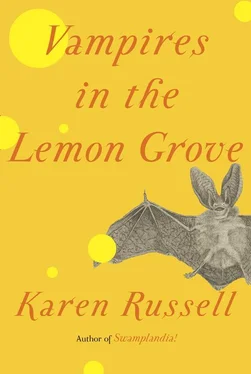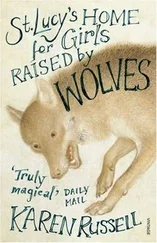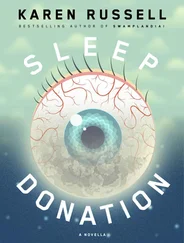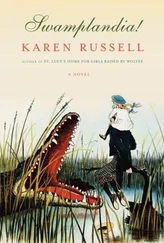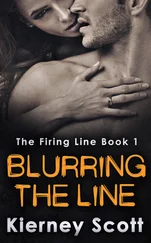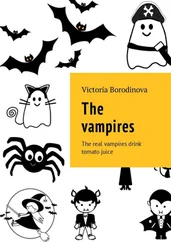When we first landed in Sorrento I was skeptical. The pitcher of lemonade we ordered looked cloudy and adulterated. Sugar clumped at the bottom. I took a gulp, and a whole small lemon lodged in my mouth; there is no word sufficiently lovely for the first taste, the first feeling of my fangs in that lemon. It was bracingly sour, with a delicate hint of ocean salt. After an initial prickling — a sort of chemical effervescence along my gums — a soothing blankness traveled from the tip of each fang to my fevered brain. These lemons are a vampire’s analgesic. If you have been thirsty for a long time, if you have been suffering, then the absence of those two feelings — however brief — becomes a kind of heaven. I breathed deeply through my nostrils. My throbbing fangs were still.
By daybreak, the numbness had begun to wear off. The lemons relieve our thirst without ending it, like a drink we can hold in our mouths but never swallow. Eventually the original hunger returns. I have tried to be very good, very correct and conscientious about not confusing this original hunger with the thing I feel for Magreb.
I CAN’T JOKE about my early years on the blood, can’t even think about them without guilt and acidic embarrassment. Unlike Magreb, who has never had a sip of the stuff, I listened to the village gossips and believed every rumor, internalized every report of corrupted bodies and boiled blood. Vampires were the favorite undead of the Enlightenment, and as a young boy I aped the diction and mannerisms I read about in books: Vlad the Impaler, Count Heinrich the Despoiler, Goethe’s bloodsucking bride of Corinth. I eavesdropped on the terrified prayers of an old woman in a cemetery, begging God to protect her from … me. I felt a dislocation then, a spreading numbness, as if I were invisible or already dead. After that, I did only what the stories suggested, beginning with that old woman’s blood. I slept in coffins, in black cedar boxes, and woke every night with a fierce headache. I was famished, perennially dizzy. I had unspeakable dreams about the sun.
In practice I was no suave viscount, just a teenager in a red velvet cape, awkward and voracious. I wanted to touch the edges of my life — the same instinct, I think, that inspires young mortals to flip tractors and enlist in foreign wars. One night I skulked into a late Mass with some vague plan to defeat eternity. At the back of the nave, I tossed my mousy curls, rolled my eyes heavenward, and then plunged my entire arm into the bronze pail of holy water. Death would be painful, probably, but I didn’t care about pain. I wanted to overturn my sentence. It was working; I could feel the burn beginning to spread. Actually, it was more like an itch, but I was sure the burning would start any second. I slid into a pew, snug in my misery, and waited for my body to turn to ash.
By sunrise, I’d developed a rash between my eyebrows, a little late-flowering acne, but was otherwise fine, and I understood I truly was immortal. At that moment I yielded all discrimination; I bit anyone kind or slow enough to let me get close: men, women, even some older boys and girls. The littlest children I left alone, very proud at the time of this one scruple. I’d read stories about Hungarian vampirs who drank the blood of orphan girls, and mentioned this to Magreb early on, hoping to impress her with my decency. Not children! she wept.
She wept for a day and a half.
Our first date was in Cementerio de Colón, if I can call a chance meeting between headstones a date. I had been stalking her, following her swishing hips as she took a shortcut through the cemetery grass. She wore her hair in a low, snaky braid that was coming unraveled. When I was near enough to touch her trailing ribbon she whipped around. “Are you following me?” she asked, annoyed, not scared. She regarded my face with the contempt of a woman confronting the town drunk. “Oh,” she said, “your teeth …”
And then she grinned. Magreb was the first and only other vampire I’d ever met. We bared our fangs over a tombstone and recognized each other. There is a loneliness that must be particular to monsters, I think, the feeling that each is the only child of a species. And now that loneliness was over.
Our first date lasted all night. Magreb’s talk seemed to lunge forward like a train without a conductor; I suspect even she didn’t know what she was saying. I certainly wasn’t paying attention, staring dopily at her fangs, and then I heard her ask: “So, when did you figure out that the blood does nothing?”
At the time of this conversation, I was edging on 130. I had never gone a day since early childhood without drinking several pints of blood. The blood does nothing? My forehead burned and burned.
“Didn’t you think it suspicious that you had a heartbeat?” she asked me. “That you had a reflection in water?”
When I didn’t answer, Magreb went on, “Every time I saw my own face in a mirror, I knew I wasn’t any of those ridiculous things, a bloodsucker, a sanguina . You know?”
“Sure,” I said, nodding. For me, mirrors had the opposite effect: I saw a mouth ringed in black blood. I saw the pale son of the villagers’ fears.
THOSE INITIAL DAYS with Magreb nearly undid me. At first my euphoria was sharp and blinding, all my thoughts spooling into a single blue thread of relief— The blood does nothing! I don’t have to drink the blood! — but when that subsided, I found I had nothing left. If we didn’t have to drink the blood, then what on earth were these fangs for?
Sometimes I think she preferred me then: I was like her own child, raw and amazed. We smashed my coffin with an ax and spent the night at a hotel. I lay there wide-eyed in the big bed, my heart thudding like a fish tail against the floor of a boat.
“You’re really sure?” I whispered to her. “I don’t have to sleep in a coffin? I don’t have to sleep through the day?” She had already drifted off.
A few months later, she suggested a picnic.
“But the sun.”
Magreb shook her head. “You poor thing, believing all that garbage.”
By this time we’d found a dirt cellar in which to live in Western Australia, where the sun burned through the clouds like dining lace. That sun ate lakes, rising out of dead volcanoes at dawn, triple the size of a harvest moon and skull-white, a grass-scorcher. Go ahead, try to walk into that sun when you’ve been told your bones are tinder.
I stared at the warped planks of the trapdoor above us, the copper ladder that led rung by rung to the bright world beyond. Time fell away from me and I was a child again, afraid, afraid. Magreb rested her hand on the small of my back. “You can do it,” she said, nudging me gently. I took a deep breath and hunched my shoulders, my scalp grazing the cellar door, my hair soaked through with sweat. I focused my thoughts to still the tremors, lest my fangs slice the inside of my mouth, and turned my face away from Magreb.
“Go on.”
I pushed up and felt the wood give way. Light exploded through the cellar. My pupils shrank to dots.
Outside, the whole world was on fire. Mute explosions rocked the scrubby forest, motes of light burning like silent rockets. The sun fell through the eucalyptus and Australian pines in bright red bars. I pulled myself out onto my belly, balled up in the soil, and screamed for mercy until I’d exhausted myself. Then I opened one watery eye and took a long look around. The sun wasn’t fatal! It was just uncomfortable, making my eyes itch and water and inducing a sneezing attack.
After that, and for the whole of our next thirty years together, I watched the auroral colors and waited to feel anything but terror. Fingers of light spread across the gray sea toward me, and I couldn’t see these colors as beautiful. The sky I lived under was a hideous, lethal mix of orange and pink, a physical deformity. By the 1950s we were living in a Cincinnati suburb; and as the day’s first light hit the kitchen windows, I’d press my face against the linoleum and gibber my terror into the cracks.
Читать дальше
